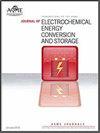Effect of Liquid Cooling Structure of Confluence Channel on Thermal Performance of Lithium-Ion Batteries
IF 1.9
4区 工程技术
Q3 ELECTROCHEMISTRY
Journal of Electrochemical Energy Conversion and Storage
Pub Date : 2023-03-08
DOI:10.1115/1.4062080
引用次数: 0
Abstract
In this study, based on the liquid cooling method, A confluence channel structure is proposed, and the heat generation model in the discharge process of three-dimensional battery module is established. The effects of channel structure, inlet mass flow rate and coolant flow direction on the heat generation of battery module were studied by control variable method. Simulation results show that the confluence channel structure ( e ) shows good cooling effect on the battery temperature when controlling the 5 C discharge of the battery module. In addition, compared with the straight channel under the same working condition. In the discharge process of battery module, Average temperature amplitude in battery module decreased by 17.3 %, the inlet and outlet pressure is reduced by 16.47 %, and the maximum temperature amplitude is reduced by 20.3 %. Effectively improve temperature uniformity and reduce pressure drop. The problem of uneven temperature distribution caused by uneven velocity distribution of coolant in traditional straight channel is improved. At the same time, the design of the confluence structure accelerates the heat transfer of the channel plate and provides a new idea for the design of the cooling channel.汇流通道液冷结构对锂离子电池热性能的影响
本研究基于液冷方法,提出了一种合流通道结构,建立了三维电池模块放电过程中的产热模型。采用控制变量法研究了通道结构、进口质量流量和冷却剂流动方向对电池模块产热的影响。仿真结果表明,在控制电池模块5℃放电时,合流通道结构(e)对电池温度具有良好的冷却效果。此外,与相同工况下的直流道进行了比较。在电池模块放电过程中,电池模块平均温度幅值降低17.3%,进出口压力降低16.47%,最大温度幅值降低20.3%。有效提高温度均匀性,降低压降。解决了传统直流道冷却剂流速分布不均匀造成的温度分布不均匀的问题。同时,合流结构的设计加速了通道板的换热,为冷却通道的设计提供了新的思路。
本文章由计算机程序翻译,如有差异,请以英文原文为准。
求助全文
约1分钟内获得全文
求助全文
来源期刊

Journal of Electrochemical Energy Conversion and Storage
Engineering-Mechanics of Materials
CiteScore
4.90
自引率
4.00%
发文量
69
期刊介绍:
The Journal of Electrochemical Energy Conversion and Storage focuses on processes, components, devices and systems that store and convert electrical and chemical energy. This journal publishes peer-reviewed archival scholarly articles, research papers, technical briefs, review articles, perspective articles, and special volumes. Specific areas of interest include electrochemical engineering, electrocatalysis, novel materials, analysis and design of components, devices, and systems, balance of plant, novel numerical and analytical simulations, advanced materials characterization, innovative material synthesis and manufacturing methods, thermal management, reliability, durability, and damage tolerance.
 求助内容:
求助内容: 应助结果提醒方式:
应助结果提醒方式:


